
Quercus coccinea, the scarlet oak, is a deciduous tree in the red oak section Lobatae of the genus Quercus, in the family Fagaceae.

Karena Lam is a Taiwanese Canadian actress and singer based in Taiwan and Hong Kong.

Banksia coccinea, commonly known as the scarlet banksia, waratah banksia or Albany banksia, is an erect shrub or small tree in the family Proteaceae. Its distribution in the wild is along the south west coast of Western Australia, from Denmark to the Stokes National Park, and north to the Stirling Range, growing on white or grey sand in shrubland, heath or open woodland. Reaching up to 8 m (26 ft) in height, it is a single-stemmed plant that has oblong leaves, which are 3–9 cm (1.2–3.5 in) long and 2–7 cm (0.8–2.8 in) wide. The prominent red and white flower spikes appear mainly in the spring. As they age they develop small follicles that store seeds until opened by fire. Though widely occurring, it is highly sensitive to dieback and large populations of plants have succumbed to the disease.

Rena Inoue is a Japanese-born American retired pair skater. With partner John Baldwin, she is the 2004 and 2006 U.S. National Champion. Inoue previously competed for Japan as both a single skater and pair skater. Inoue and Baldwin are the first skaters to perform a throw triple Axel in competition.

The Chōshū Domain, also known as the Hagi Domain, was a domain (han) of the Tokugawa Shogunate of Japan during the Edo period from 1600 to 1871.
Super bantamweight, also known as junior featherweight, is a weight class in professional boxing, contested from 118 pounds (54 kg) and up to 122 pounds (55 kg).
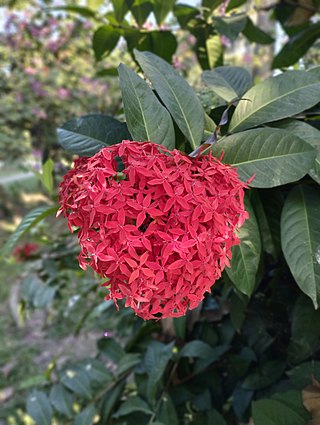
Ixora is a genus of flowering plants in the family Rubiaceae. It is the only genus in the tribe Ixoreae. It consists of tropical evergreen trees and shrubs and holds around 544 species. Though native to the tropical and subtropical areas throughout the world, its centre of diversity is in Tropical Asia. Ixora also grows commonly in subtropical climates in the United States, such as Florida where it is commonly known as West Indian jasmine.
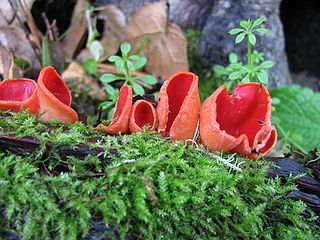
Sarcoscypha coccinea, commonly known as the scarlet elf cup, or the scarlet cup, is a species of fungus in the family Sarcoscyphaceae of the order Pezizales. The fungus, widely distributed in the Northern Hemisphere, has been found in Africa, Asia, Europe, North and South America, and Australia. The type species of the genus Sarcoscypha, S. coccinea has been known by many names since its first appearance in the scientific literature in 1772. Phylogenetic analysis shows the species to be most closely related to other Sarcoscypha species that contain numerous small oil droplets in their spores, such as the North Atlantic island species S. macaronesica. Due to similar physical appearances and sometimes overlapping distributions, S. coccinea has often been confused with S. occidentalis, S. austriaca, and S. dudleyi.

Boerhavia coccinea is a species of flowering plant in the four o'clock family which is known by many common names, including tar vinescarlet spiderling and red boerhavia.
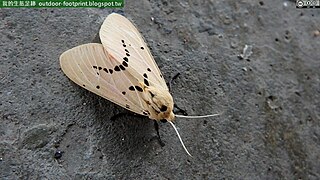
Spilarctia is a genus of moths in the family Erebidae. The genus was erected by Arthur Gardiner Butler in 1875.

Evecliptopera is a monotypic moth genus in the family Geometridae described by Inoue in 1982. Its only species, Evecliptopera decurrens, first described by Frederic Moore in 1888, is found in northern India, Nepal, south-western China, Japan, the Russian Far East and Taiwan.

Heterolocha is a genus of moths in the family Geometridae described by Julius Lederer in 1853.
Ambulyx tobii is a species of moth of the family Sphingidae first described by Hiroshi Inoue in 1976. It is found from Japan and South Korea down through eastern China to Bhutan, Tibet, Yunnan, Vietnam and Taiwan.
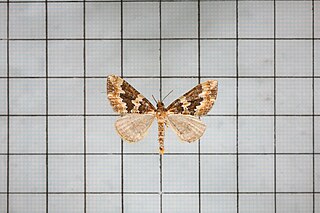
Electrophaes taiwana is a moth in the family Geometridae first described by Hiroshi Inoue in 1986. It is found in Taiwan.

Heterolocha arizana is a species of moth in the family Geometridae. It is found in Taiwan.
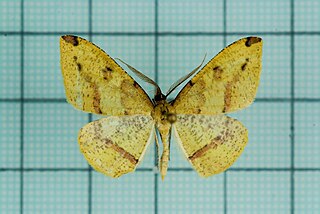
Heterolocha biplagiata is a species of moth in the family Geometridae first described by Max Bastelberger in 1909. It is found in Taiwan.

Heterolocha marginata is a species of moth in the family Geometridae first described by Alfred Ernest Wileman in 1910. It is found in Taiwan.
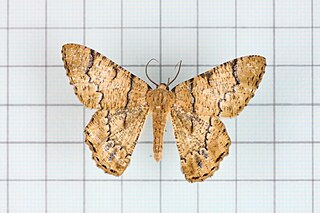
Lophophelma iterans is a moth of the family Geometridae first described by Louis Beethoven Prout in 1926. It is found in China and Taiwan.

Heterolocha hypoleuca is a species of moth in the family Geometridae first described by George Hampson in 1907. It is found in India.
















